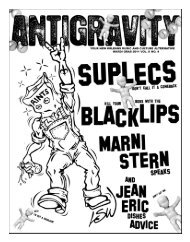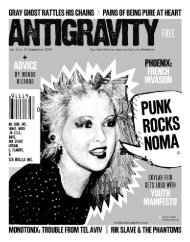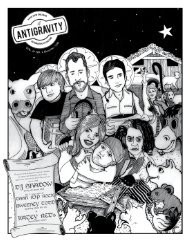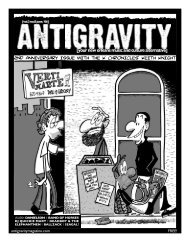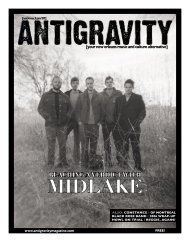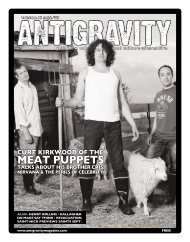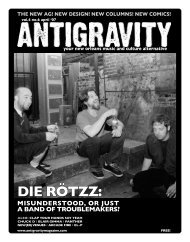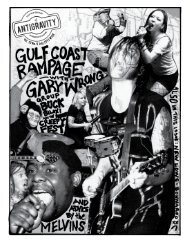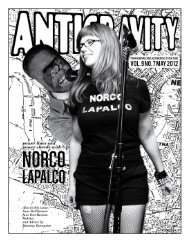September 2008 (PDF) - Antigravity Magazine
September 2008 (PDF) - Antigravity Magazine
September 2008 (PDF) - Antigravity Magazine
You also want an ePaper? Increase the reach of your titles
YUMPU automatically turns print PDFs into web optimized ePapers that Google loves.
REVIEWSCOMICS<br />
GREGG HUR-<br />
WITZ, LAURENCE<br />
CAMPBELL<br />
PUNISHER #61<br />
(MARVEL MAX)<br />
was skeptical, I’ll admit<br />
I it. Anyone who wants to<br />
write Punisher so badly that<br />
he’ll turn Foolkiller into a<br />
third-rate Frank Castle just for<br />
the chance seemed like a guy<br />
who might border on fanficquality<br />
for the character. And<br />
following up Garth Ennis’s long run on the character, which<br />
has had a whole lot of high points? It’s a suicide mission.<br />
But I’ll be damned if Hurwitz and Campbell (ably assisted<br />
by ace colorist Lee Loughridge) didn’t deliver a hell of a<br />
crime thriller here. Un-investigated violence in Mexican<br />
border towns seems to be a comics meme of late (witness<br />
Blue Beetle, Manhunter, etc.), and that’s the central story<br />
here—girls are being abducted by a scary group of people<br />
for unspeakable reasons. Their town in trouble, one man<br />
heads north to find a hero in America who can help them.<br />
It’s the plot that launched a thousand and one westerns, and<br />
Hurwitz makes it interesting largely due to seeing inside<br />
Frank Castle’s head on the thirty-first anniversary of his<br />
family’s death but also because the moment-to-moment<br />
characterization and dialogue is believable and interesting.<br />
Hurwitz makes the reader care about the plight of these<br />
people, fleshing them out in the few pages he has so when the<br />
Punisher inevitably steps in, even at his most ultraviolent, he<br />
comes across not as an unhinged vigilante but a white knight<br />
whose brutal methods are nothing less than what the villains<br />
deserve. It doesn’t hurt that the ambiance in this issue is<br />
dark, moody but absolutely readable, as Campbell turns<br />
in craggy, textured work reminiscent of Michael Lark and<br />
Alex Maleev and frames the story with clear, perfect panelto-panel<br />
storytelling and snapshot moments. Loughridge<br />
serves up a dark world with occasional bright spots in the<br />
form of neon lights and burning cigarettes. It’s a palette built<br />
for crime stories and that’s what Hurwitz has going here, an<br />
intriguing little crime drama whose protagonist just happens<br />
to be the baddest vigilante comics ever created. I know the<br />
inclination for most was probably to bail on Punisher now<br />
that Ennis has had his final say, but if Hurwitz, Campbell<br />
and company can follow up as strongly as they open, that<br />
would be a big mistake. —Randy Lander<br />
G. WILLOW WIL-<br />
SON, M.K. PERKER<br />
AIR #1<br />
(DC/VERTIGO)<br />
Neil Gaiman’s cover quote<br />
for Air indicates that he’s<br />
read the first half-dozen issues<br />
and enjoyed them to no end. I,<br />
on the other hand, have only<br />
read the first issue, and while<br />
it’s not unpleasant I honestly<br />
have no idea what the book is<br />
about. There’s an acrophobic<br />
stewardess, a mysterious man of many aliases, a vigilante<br />
airplane patrol group with sinister leanings and plenty of<br />
fight sequences, but despite all these goings-on there are<br />
only hints about what the book is about, either thematically<br />
or in terms of plot. In addition, while the long game can<br />
work for a series if it’s interesting on a moment-to-moment<br />
basis, Blythe (our lead) takes everything in stride, and so<br />
the weirdness, the excitement and the suspense are nonexistent.<br />
The reader isn’t worried because the character<br />
isn’t worried, and so every event passes with as much<br />
passion and intensity as crossing items off a to-do list. On<br />
the upside, Perker’s artwork is very nice, with beautiful<br />
attention to detail and a style that blends realism effectively<br />
with a touch of stylization, similar to the kind of thing that<br />
Dave Gibbons does so well. And as I said upfront, there’s<br />
nothing particularly wrong with Air. But an unclear premise<br />
and a somewhat dry approach to the writing makes this<br />
another soft Vertigo launch when what they need is another<br />
barn-burner like Fables, Y The Last Man or Preacher, a first<br />
issue that grabs you by the throat and doesn’t let go. Air<br />
more kind of softly nudges you to try and get your attention.<br />
—Randy Lander<br />
There are two different<br />
takes on Venom. One is<br />
that his motivating force is the<br />
symbiote, and without it Eddie<br />
Brock is at best a mediocre<br />
human being. The other is<br />
that Eddie is a true scumbag,<br />
with or without the symbiote.<br />
Truthfully, I prefer the former. Venom: Dark Origin is all about<br />
the latter. We see Eddie doing the wrong thing at every turn,<br />
and he’s a class-A creep, just this side of sociopathic. It’s all<br />
a bit much, especially since writer Zeb Wells is a bit on the<br />
nose in showing that every single thing Brock experiences<br />
ties neatly into what he will become.<br />
Continued on Page 37...<br />
ZEB WELLS,<br />
ANGEL MEDIA<br />
VENOM: DARK<br />
ORIGIN #1<br />
(MARVEL)<br />
antigravitymagazine.com_29



